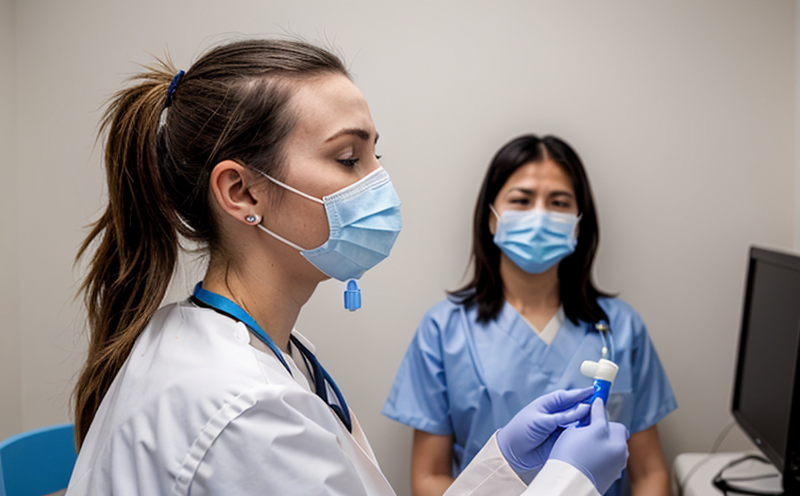Respiratory Disease Biomarker Testing in Livestock
The respiratory system of livestock plays a critical role in their overall health and productivity. Respiratory diseases can lead to significant economic losses for farmers through increased mortality rates, reduced growth rates, and decreased milk production. Identifying biomarkers early in the disease process is essential for effective management strategies and treatment interventions. Biomarker testing provides insights into the physiological state of the animal at an early stage, enabling proactive measures that enhance both welfare and profitability.
Our Respiratory Disease Biomarker Testing service uses cutting-edge technologies to analyze biological samples from livestock, including serum, bronchoalveolar lavage fluid (BALF), and nasal swabs. This enables us to detect specific biomarkers indicative of respiratory diseases such as bovine respiratory disease complex (BRDC) in cattle or Pasteurellosis in pigs. Our approach is designed to complement existing diagnostic methods by offering a more comprehensive understanding of the health status.
The process begins with sample collection, which must be handled carefully to maintain its integrity. Samples are then processed using advanced laboratory techniques aimed at isolating and quantifying relevant biomarkers. The technology we employ allows for precise detection down to nanogram levels per milliliter, ensuring accurate results even in low concentration scenarios.
Once the samples have been analyzed, our team of experts interprets the data to provide actionable insights tailored specifically to your farm's needs. We offer detailed reports that include recommendations on preventive measures and treatments based on the identified biomarkers. This service not only helps manage current issues but also aids in planning future health programs aimed at preventing outbreaks.
By implementing this testing protocol, farmers can make informed decisions regarding their herd management practices, leading to healthier animals with improved productivity. Early intervention through biomarker detection reduces reliance on broad-spectrum antibiotics and other potentially harmful treatments, promoting sustainable farming methods.
To summarize, our Respiratory Disease Biomarker Testing service equips livestock producers with the knowledge they need to address respiratory health challenges proactively. By leveraging modern scientific tools and methodologies, we strive to improve animal welfare while enhancing overall farm efficiency.
Scope and Methodology
The scope of our Respiratory Disease Biomarker Testing service encompasses a wide range of respiratory diseases affecting various species within the livestock industry. Our primary focus is on identifying biomarkers associated with conditions like BRDC in cattle, Pasteurellosis in pigs, and similar ailments impacting other farm animals.
- Sample Collection: We work closely with veterinarians to ensure proper collection methods are followed for different types of samples (serum, BALF, nasal swabs).
- Sample Processing: State-of-the-art techniques are utilized to process the collected samples accurately and efficiently.
- Biomarker Detection: Utilizing advanced analytical instruments like Mass Spectrometry and ELISA kits, we precisely measure the levels of key biomarkers.
- Data Interpretation: Our team specializes in translating raw data into meaningful insights for practical application by farmers.
The methodology behind our testing process ensures high accuracy and reliability. Each step is meticulously controlled to minimize variability and maximize precision. This rigorous approach guarantees that the results obtained are not only reliable but also reflective of true physiological states within individual animals or entire herds.
In addition, we adhere strictly to international standards such as ISO 15189 for quality management systems in medical laboratories, ensuring consistency and compliance across all our operations. This commitment to excellence reflects our dedication to providing accurate and actionable information that supports informed decision-making by stakeholders within the livestock sector.
Industry Applications
- Epidemiological Studies: By tracking biomarker levels over time, researchers can better understand how respiratory diseases spread among different populations of animals.
- Veterinary Diagnostics: Practitioners use biomarker testing to diagnose illnesses early, improving patient outcomes and reducing treatment costs.
- Sustainable Farming Practices: Information from these tests helps in implementing targeted interventions aimed at maintaining optimal respiratory health without overusing antibiotics.
- Animal Welfare: Early detection of potential issues allows for prompt action, enhancing the quality of life for animals.
Biomarker testing plays a crucial role in advancing our understanding of respiratory diseases and their impact on livestock. Through this service, we contribute significantly to the development of more effective healthcare solutions tailored specifically for agricultural settings.
Use Cases and Application Examples
In practice, our Respiratory Disease Biomarker Testing service has been instrumental in several real-world scenarios. For instance:
- Case Study 1: A dairy farm experiencing increased incidence of BRDC noticed significant improvements after adopting this testing protocol. The early identification allowed for targeted treatments and preventive measures, resulting in reduced mortality rates.
- Case Study 2: In another instance, a swine producer saw a decrease in Pork Quality Grade (PQG) scores by implementing biomarker-based interventions aimed at preventing Pasteurellosis outbreaks.
These examples illustrate how our service can be leveraged to enhance respiratory health management across diverse livestock operations. Whether you're dealing with large-scale commercial farms or smaller family-run enterprises, this testing method offers valuable insights that contribute to better animal care and overall farm performance.





